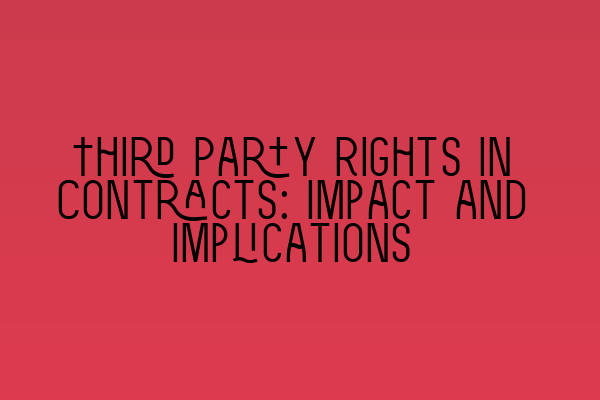Third Party Rights in Contracts: Impact and Implications
In the world of contract law, it is essential to consider not only the rights and obligations of the parties directly involved but also the potential impact on third parties. A third party, in this context, refers to an individual or entity that is not a party to the original contract but may have some sort of interest in the contract or may be affected by its terms. Understanding third party rights is crucial for solicitors and anyone involved in drafting, negotiating, or enforcing contracts.
In this article, we will explore the impact and implications of third party rights in contracts. We will discuss the different types of third party rights, the circumstances under which they may arise, and the legal framework governing their enforcement. By shedding light on this often complex and overlooked aspect of contract law, we aim to provide valuable insights for legal professionals and individuals engaged in contractual relationships.
Types of Third Party Rights
There are various types of third party rights that may arise in contracts. The most common types include the following:
1. Third Party Beneficiary Rights: This occurs when the parties to a contract intend to confer certain rights or benefits on a third party. The third party, known as the beneficiary, is not a party to the contract but has the right to enforce its terms. For example, if A contracts with B to provide services to C, C becomes a third party beneficiary and can enforce the contract against both A and B.
2. Assignment of Rights: Contractual rights can be assigned or transferred from one party to another. When a party assigns their rights under a contract to a third party, such third party can step into the shoes of the original party and enforce those rights against the other party. Assignments can be partial or complete, and they can be made with or without the consent of the other party. However, certain rights may not be assignable, such as personal services.
3. Privity of Contract: Privity refers to the direct relationship between the parties to a contract. Traditionally, only parties to a contract had rights and obligations under it, meaning that a third party could not enforce the contract or be held liable for its breaches. However, modern legal developments have recognized certain exceptions to the privity rule, allowing third parties to assert rights under a contract in limited circumstances.
Legal Framework for Enforcing Third Party Rights
The legal framework for enforcing third party rights varies depending on jurisdiction and the type of third party right involved. In the United Kingdom, the Contracts (Rights of Third Parties) Act 1999 is a key piece of legislation governing third party rights. This Act provides that a third party may enforce a term of a contract if:
– The contract expressly provides for the third party’s right to enforce; or
– The term purports to give the third party a benefit.
However, it is important to note that the Act also allows the parties to exclude or limit the rights of third parties in certain circumstances. Therefore, careful drafting of contracts is necessary to ensure that the parties’ intentions regarding third party rights are clearly expressed.
Impact and Implications
The inclusion or exclusion of third party rights in contracts can have significant implications for parties involved. By recognizing and protecting the rights of third parties, contracts can provide a more robust and comprehensive legal framework. This, in turn, can enhance the efficiency and effectiveness of contractual relationships.
For example, including third party beneficiary rights in a contract can provide additional protection and certainty to parties who rely on the performance of the contract. By allowing third parties to enforce the contract, it becomes easier to remedy any breaches and ensure that all parties fulfill their obligations.
On the other hand, the exclusion of third party rights may limit the ability of third parties to seek redress in the event of a breach. This can create challenges and complexities, especially in complex commercial transactions involving multiple stakeholders.
Conclusion
Third party rights in contracts can have a significant impact on the rights, obligations, and overall effectiveness of contractual relationships. Understanding the different types of third party rights, the legal framework governing their enforcement, and the implications of their inclusion or exclusion is crucial for legal professionals and individuals engaging in contractual arrangements.
To learn more about other topics related to contract law and legal practice, check out these related articles:
– Mentorship for Aspiring Solicitors: Nurturing Talent in the Legal Field
– Legal Challenges and Pitfalls: Navigating the Complexities of the Legal System
– The Benefits of Becoming a Solicitor: A Rewarding Career
– Law School in the UK: Your Guide to Starting Your Legal Journey
– Striking a Balance: Work-Life Harmony in the Legal Field
By staying informed and proactive in addressing third party rights in contracts, legal professionals can provide their clients with comprehensive and effective legal representation.
